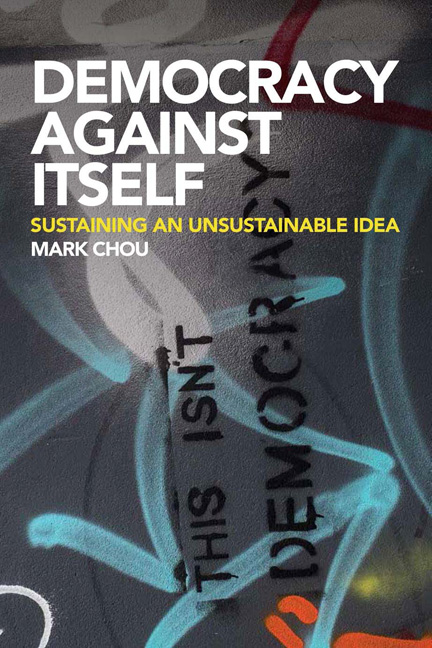Book contents
- Frontmatter
- Contents
- Introduction
- 1 Democracy Against Itself
- 2 Democracy in Athens: Autonomy, Tragedy and Decline
- 3 Democide in Weimar: Militant Democracy and the Paradox of Self-Defence
- 4 The Coming Authoritarianism: The State of America's Democracy
- 5 China's New Authoritarianism: A Glimpse at Our Post- Democratic Future?
- 6 Occupy Democracy: Democracy Against Itself and the Global Occupy Movement
- Bibliography
- Index
Introduction
Published online by Cambridge University Press: 07 December 2017
- Frontmatter
- Contents
- Introduction
- 1 Democracy Against Itself
- 2 Democracy in Athens: Autonomy, Tragedy and Decline
- 3 Democide in Weimar: Militant Democracy and the Paradox of Self-Defence
- 4 The Coming Authoritarianism: The State of America's Democracy
- 5 China's New Authoritarianism: A Glimpse at Our Post- Democratic Future?
- 6 Occupy Democracy: Democracy Against Itself and the Global Occupy Movement
- Bibliography
- Index
Summary
Democracies are not impervious to ruin. On 3 July 2013, barely one year after his inauguration as Egypt's first democratically elected president, Mohamed Morsi was ousted in a bloodless and widely backed coup. Amid increasing claims of a creeping authoritarianism exhibited in his rule, worried citizens and opposition politicians openly called for Morsi's resignation and then removal. Days following his first anniversary in office, the Egyptian military intervened. Spurred on by the popular support, and fearful that the country would be further destabilised by mass protests, General Abdul Fatah al-Sisi issued Morsi's government with an ultimatum: either meet the democratic demands of the Egyptian people or the military will move to suspend the country's constitution. Three days later, Morsi was forcibly removed from office. Adly Mansour, Egypt's Chief Justice, was promptly named as the country's interim president. But far from restoring order, as many believed this essentially ‘democratic’ coup would, Egypt descended further into chaos. The violence which the military had hoped to quell intensified. Lives were risked and lost. Casualties mounted. And democracy, even now, seems a faraway prospect.
As Egypt's political saga continues to play itself out, commentators have already begun asking what this latest episode says about the sustainability of democracy. Democrats who have long rejected the claim that democracies can be destroyed by their own citizens and political leaders are now having to think again as the Arab Spring gives way to Autumn rage. True, democracies are sprouting up globally in unexpected places. But that may mean little if what we are seeing in places like Egypt turns out to be a sign for what might happen elsewhere. Should this be the case then it may be time for those who support democracy to stop trumpeting on about how sustainable a practice democracy is.
This book does just that. It argues that democratic failure is a prospect that remains very much entrenched both within the idea and ideal of democracy. Democratic self-destruction – or democracy against itself – is a possible outcome of democratic politics. Ignoring this prospect does not make democracy more sustainable. If anything, the opposite is true. Now more than ever, as more and more countries become democratic, our attention needs to turn to how we sustain this essentially unsustainable idea.
- Type
- Chapter
- Information
- Democracy Against ItselfSustaining an Unsustainable Idea, pp. vii - xiiPublisher: Edinburgh University PressPrint publication year: 2014



